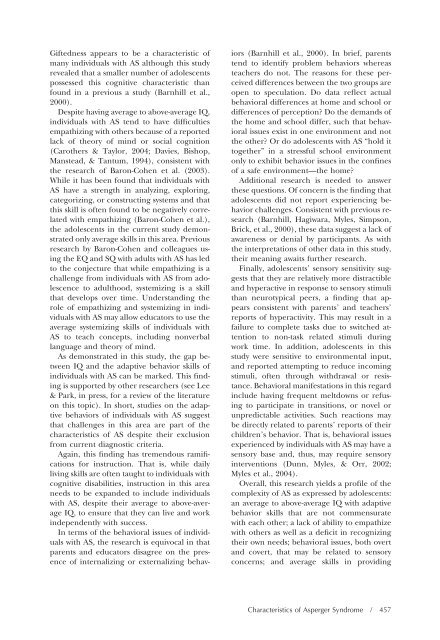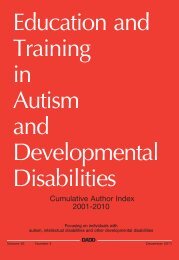A Large-Scale Study of the Characteristics of Asperger Syndrome
A Large-Scale Study of the Characteristics of Asperger Syndrome
A Large-Scale Study of the Characteristics of Asperger Syndrome
Create successful ePaper yourself
Turn your PDF publications into a flip-book with our unique Google optimized e-Paper software.
Giftedness appears to be a characteristic <strong>of</strong><br />
many individuals with AS although this study<br />
revealed that a smaller number <strong>of</strong> adolescents<br />
possessed this cognitive characteristic than<br />
found in a previous a study (Barnhill et al.,<br />
2000).<br />
Despite having average to above-average IQ,<br />
individuals with AS tend to have difficulties<br />
empathizing with o<strong>the</strong>rs because <strong>of</strong> a reported<br />
lack <strong>of</strong> <strong>the</strong>ory <strong>of</strong> mind or social cognition<br />
(Caro<strong>the</strong>rs & Taylor, 2004; Davies, Bishop,<br />
Manstead, & Tantum, 1994), consistent with<br />
<strong>the</strong> research <strong>of</strong> Baron-Cohen et al. (2003).<br />
While it has been found that individuals with<br />
AS have a strength in analyzing, exploring,<br />
categorizing, or constructing systems and that<br />
this skill is <strong>of</strong>ten found to be negatively correlated<br />
with empathizing (Baron-Cohen et al.),<br />
<strong>the</strong> adolescents in <strong>the</strong> current study demonstrated<br />
only average skills in this area. Previous<br />
research by Baron-Cohen and colleagues using<br />
<strong>the</strong> EQ and SQ with adults with AS has led<br />
to <strong>the</strong> conjecture that while empathizing is a<br />
challenge from individuals with AS from adolescence<br />
to adulthood, systemizing is a skill<br />
that develops over time. Understanding <strong>the</strong><br />
role <strong>of</strong> empathizing and systemizing in individuals<br />
with AS may allow educators to use <strong>the</strong><br />
average systemizing skills <strong>of</strong> individuals with<br />
AS to teach concepts, including nonverbal<br />
language and <strong>the</strong>ory <strong>of</strong> mind.<br />
As demonstrated in this study, <strong>the</strong> gap between<br />
IQ and <strong>the</strong> adaptive behavior skills <strong>of</strong><br />
individuals with AS can be marked. This finding<br />
is supported by o<strong>the</strong>r researchers (see Lee<br />
& Park, in press, for a review <strong>of</strong> <strong>the</strong> literature<br />
on this topic). In short, studies on <strong>the</strong> adaptive<br />
behaviors <strong>of</strong> individuals with AS suggest<br />
that challenges in this area are part <strong>of</strong> <strong>the</strong><br />
characteristics <strong>of</strong> AS despite <strong>the</strong>ir exclusion<br />
from current diagnostic criteria.<br />
Again, this finding has tremendous ramifications<br />
for instruction. That is, while daily<br />
living skills are <strong>of</strong>ten taught to individuals with<br />
cognitive disabilities, instruction in this area<br />
needs to be expanded to include individuals<br />
with AS, despite <strong>the</strong>ir average to above-average<br />
IQ, to ensure that <strong>the</strong>y can live and work<br />
independently with success.<br />
In terms <strong>of</strong> <strong>the</strong> behavioral issues <strong>of</strong> individuals<br />
with AS, <strong>the</strong> research is equivocal in that<br />
parents and educators disagree on <strong>the</strong> presence<br />
<strong>of</strong> internalizing or externalizing behav-<br />
iors (Barnhill et al., 2000). In brief, parents<br />
tend to identify problem behaviors whereas<br />
teachers do not. The reasons for <strong>the</strong>se perceived<br />
differences between <strong>the</strong> two groups are<br />
open to speculation. Do data reflect actual<br />
behavioral differences at home and school or<br />
differences <strong>of</strong> perception? Do <strong>the</strong> demands <strong>of</strong><br />
<strong>the</strong> home and school differ, such that behavioral<br />
issues exist in one environment and not<br />
<strong>the</strong> o<strong>the</strong>r? Or do adolescents with AS “hold it<br />
toge<strong>the</strong>r” in a stressful school environment<br />
only to exhibit behavior issues in <strong>the</strong> confines<br />
<strong>of</strong> a safe environment—<strong>the</strong> home?<br />
Additional research is needed to answer<br />
<strong>the</strong>se questions. Of concern is <strong>the</strong> finding that<br />
adolescents did not report experiencing behavior<br />
challenges. Consistent with previous research<br />
(Barnhill, Hagiwara, Myles, Simpson,<br />
Brick, et al., 2000), <strong>the</strong>se data suggest a lack <strong>of</strong><br />
awareness or denial by participants. As with<br />
<strong>the</strong> interpretations <strong>of</strong> o<strong>the</strong>r data in this study,<br />
<strong>the</strong>ir meaning awaits fur<strong>the</strong>r research.<br />
Finally, adolescents’ sensory sensitivity suggests<br />
that <strong>the</strong>y are relatively more distractible<br />
and hyperactive in response to sensory stimuli<br />
than neurotypical peers, a finding that appears<br />
consistent with parents’ and teachers’<br />
reports <strong>of</strong> hyperactivity. This may result in a<br />
failure to complete tasks due to switched attention<br />
to non-task related stimuli during<br />
work time. In addition, adolescents in this<br />
study were sensitive to environmental input,<br />
and reported attempting to reduce incoming<br />
stimuli, <strong>of</strong>ten through withdrawal or resistance.<br />
Behavioral manifestations in this regard<br />
include having frequent meltdowns or refusing<br />
to participate in transitions, or novel or<br />
unpredictable activities. Such reactions may<br />
be directly related to parents’ reports <strong>of</strong> <strong>the</strong>ir<br />
children’s behavior. That is, behavioral issues<br />
experienced by individuals with AS may have a<br />
sensory base and, thus, may require sensory<br />
interventions (Dunn, Myles, & Orr, 2002;<br />
Myles et al., 2004).<br />
Overall, this research yields a pr<strong>of</strong>ile <strong>of</strong> <strong>the</strong><br />
complexity <strong>of</strong> AS as expressed by adolescents:<br />
an average to above-average IQ with adaptive<br />
behavior skills that are not commensurate<br />
with each o<strong>the</strong>r; a lack <strong>of</strong> ability to empathize<br />
with o<strong>the</strong>rs as well as a deficit in recognizing<br />
<strong>the</strong>ir own needs; behavioral issues, both overt<br />
and covert, that may be related to sensory<br />
concerns; and average skills in providing<br />
<strong>Characteristics</strong> <strong>of</strong> <strong>Asperger</strong> <strong>Syndrome</strong> / 457

















